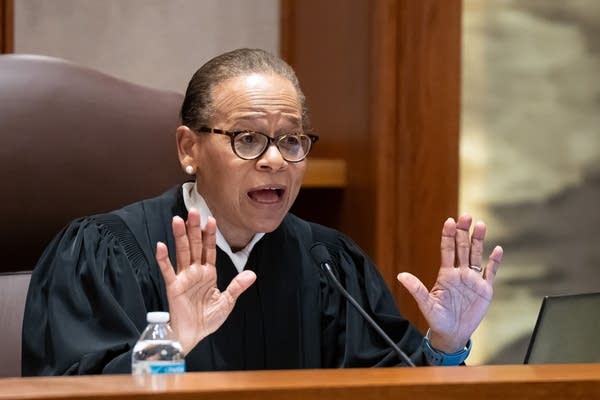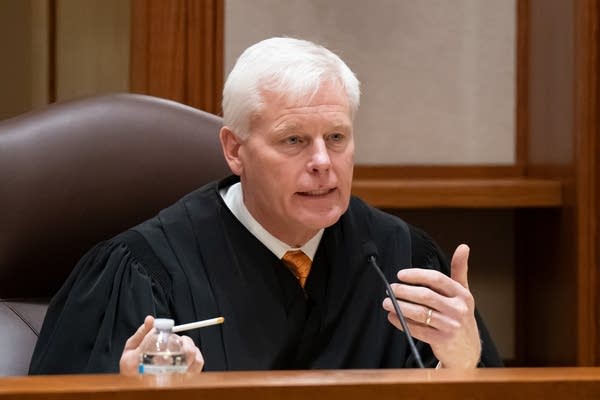The Minnesota Supreme Court is likely to decide within a month if the Legal Marijuana Now Party will retain elevated status, after arguments Tuesday that focused on its unique leadership structure and the state’s laws governing party control.
The DFL Party sued to strip major-party certification, arguing that Legal Marijuana Now failed to meet the operational threshold for retaining the major seal it first attained in 2018. The case is being expedited because candidate filing begins in a little more than a month.
The outcome matters because major parties get automatic ballot access, campaign subsidies and the ability to have poll challengers during elections. Candidates in minor parties need to gather petitions to get on ballots.
Currently, the three major parties are the Minnesota DFL, the Republican Party of Minnesota and the Legal Marijuana Now Party.
State law requires major parties to hold regular conventions and meet other leadership standards. According to filings in the case, Legal Marijuana Now prides itself on having consensus-driven “doobie rules” and vests much power in The Head Council — or THC for short — instead of deferring to decisions of convention delegates. A court-appointed referee previously found that the legal standards weren’t met by this arrangement.
Still, the Supreme Court’s oral arguments made clear that justices were uncomfortable setting the bar between minor and major parties in the state in this first-of-its-kind case.

Chief Justice Natalie Hudson pressed a DFL attorney why the state should be involved this deeply in party affairs.
“They may not be orderly in terms of what the DFL would like to see or what anybody else would like to see,” Hudson said early in the 70-minute hearing. “But do they have to be?”
Justice Paul Thissen posed a similar string of questions to lawyers throughout the arguments.
Although Thissen said it could help state officials get a clearer idea of “who to listen to” when it comes to party affairs, he added, “why does the state have to dictate which of those entities have to be listened to?”

David Zoll, an attorney for the DFL, responded: “Just as there are tiered leadership requirements, there are tiered benefits that come with that status.”
Zoll said later in the hearing that major parties are rightfully held to a higher standard.
“They can organize themselves however they want to,” he said. “But if they want the benefits that come with major-party status, they have to satisfy the statutory requirements.”
During his turn at the lectern, Legal Marijuana Now attorney Erick Kaardal disputed that the arrangement fell short.
“My client read the statutes and constitution, thought they did what they had to do and would do more if they had to do it,” he said, adding that the organizational decision was about efficiency, not defiance.
- Minnesota DFLchallenges Legal Marijuana Now status ahead of 2024 election
- New political partiestry to organize around support for legal marijuana
Two marijuana-related parties won major status in 2018 after at least one of their candidates won at least 5 percent of the vote in a statewide race. Grassroots-Legalize Cannabis fell down a rung after failing to meet that threshold in following elections. Legal Marijuana Now has held on, although it hasn’t had as much success of late.
But candidates for the party have vexed Democrats in some close contests since 2020 because they’ve managed more than the margin of victory for Republicans over Democrats. DFL leaders also say the ballot line has been used for political mischief.
In a campaign finance report filed Tuesday, the Legal Marijuana Now Party revealed its bank balance at this stage in the election year is $830. Major party candidates can qualify for state campaign subsidies amassed through an income-tax checkoff.
Two justices have recused themselves in the case — Karl Procaccini and Margaret Chutich, for reasons they aren’t required to specify — meaning the ultimate call will come down to the remaining five.
Jon Woodruff, an attorney for the Secretary of State’s Office, asked justices for a swift decision
“If decided by May 15, it will provide all parties to the election — candidates and the secretary and the other election administrators throughout the state — enough time to proceed with knowledge of what their requirements are,” Woodruff said.
The two-week candidate filing period for most state and federal offices on Minnesota’s ballot opens on May 21, although parties have until late August to submit their nominees in the presidential race.
“We’ll try to be as prompt as possible,” Chief Justice Hudson said in adjourning the hearing.
Collected from Minnesota Public Radio News. View original source here.
 Minnesota Public Radio (MPR) is a public radio network for the state of Minnesota. With its three services, News & Information, YourClassical MPR and The Current, MPR operates a 46-station regional radio network in the upper Midwest.
Last updated from
Minnesota Public Radio (MPR) is a public radio network for the state of Minnesota. With its three services, News & Information, YourClassical MPR and The Current, MPR operates a 46-station regional radio network in the upper Midwest.
Last updated from